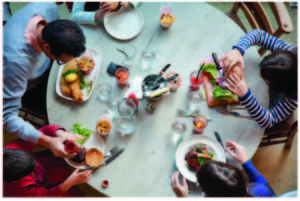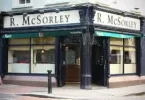Up to half of restaurants face closure without assistance – report

“This report is damning evidence that our sector needs support measures put in place immediately by the government.” – RAI Chief Executive Adrian Cummins.
It also warns that recently-promoted staycations or weekends away “will not be an option” if the Tourism and Hospitality industry is not supported.
The RAI announcement follows the release of a “damning” report prepared by Economist Jim Power on the consequences of not supporting the Restaurant sector. The report states that the Accommodation and Food Services sector has been seriously damaged by the Covid-19 crisis and as such it represents the first fully-costed recovery plan published for the industry.
Jim Power pointed out that once it re-opens, the Restaurant sector’s trading environment will be extremely challenging as a result of social-distancing requirements, various health protocols, the absence of overseas visitors and consumer nervousness.
The Sector is a major employer all over Ireland and is an essential element of economic and social life, arguably the most important component of Ireland’s tourism offering, he said.
“It seems clear that many restaurants will struggle to survive in the challenging environment ahead, but it is equally clear that in order to rebuild the economically vital tourism sector over the next couple of years, it’s essential that we have an abundance of high quality restaurants in the country,” he said, “It’s essential that the restaurant sector gets the maximum possible support from Government to get the sector through the difficult times ahead. The cost of such support would be far outweighed by the cost of doing nothing, in terms of job losses all over Ireland, closed businesses on the streets of towns, villages and cities all over the country and the damage to Ireland’s tourism offering.”
Speaking today, the Restaurants Association of Ireland Chief Executive Adrian Cummins warned that, “This report is damning evidence that our sector needs support measures put in place immediately by the government. Our members are stating that a 50% staff layoff is inevitable unless they receive supports and in the long run, we estimate that almost 50% of restaurant businesses will struggle and shut their doors if the government do not intervene.
“The government have been promoting staycations and weekends away for the months ahead. Let me be very clear on this. There will be no staycations if our restaurants and hospitality businesses close. Indigenous businesses will be lost forever.
“The landlords and the banks are bearing down on businesses who are already struggling. How can we be expected to stay on top of payments when the new social distancing rules will see the capacity for customers significantly reduced?
“The plan put forward in this report is very comprehensive in both how it will be executed and how much it would cost. But more importantly it highlights how much it will cost us in the long run to do nothing. This report lines-up almost perfectly with the asks from our own RAI 9-point crisis recovery plan.”
The eight recovery measures highlighted in the report are:
1. Labour Cost Support:During the crisis, the Government sensibly stepped in and provided a temporary wage subsidy of 85% of takehome pay up to a maximum weekly tax-free amount of €410 per week. These payments must continue beyond August and consideration must be given to continuation on a sectoral basis. It is probable that on a best-case scenario, it could take restaurants up to 24 months to return to pre-Covid-19 levels of activity. During that 24-month period it will be necessary to continue to provide financial support on a gradually reducing basis.
2. Local Authority Charges: Rates, Water, Wastewater & Street Furniture Charges represent a major cost burden for restaurants. They will prove very difficult to cover during the lockdown period, but until restaurant business gets back towards pre-Covid levels of activity, which is likely to take at least 24 months, they will represent a very significant cost burden on business. State intervention to cover 100% of these costs is necessary during the period of forced business closure. However, ongoing intervention in the form of a grant to cover these costs and keep the businesses solvent will be very important over the following 24 months.
3. Reduced VAT rate: A Zero % VAT rate for the restaurant sector should be introduced until the end of 2021. This should then be followed by a reversion to the 9% VAT rate on a permanent basis to assist recovery, create certainty and secure a viable and sustainable future for the sector.
4. Commercial Rents: A scheme to reduce the burden of commercial rents is essential from the perspective of restaurant owners and landlords. Rents represent a significant fixed cost and should be included in a package of support measures covering all occupancy costs.
The following rent support grant mechanism is suggested:
100% grant during period when restaurants are closed
80% grant during period when turnover is down 80-100%
50% grant during period when turnover is down 50-80%
25% grant during period when turnover is down 25-50%.
5. Debt Repayment Re-Structuring: Government and industry stakeholders need to get agreement from the banks to re- schedule the repayment of Term Loans, Overdrafts, Business Mortgages, Finance Leases and Hire Purchase loans for a 2-year period from the date of the forced closure of the business, where businesses are unable to meet current debt obligations, but where loans were performing as at 31st December 2019. A graduated scheme of alleviation would be appropriate, including:
- Re-scheduling of all debt repayments (interest and capital) during the forced closure of the restaurant sector
- Interest-only repayments for the 12-month period from the closure of the business.
6. Liquidity: Official intervention to ensure adequate liquidity for all businesses is essential. Without the immediate provision of working capital, many small firms will go out of business and many jobs will be permanently lost, but longer-term more permanent support will be necessary in many cases. An interest-free working capital fund of €500 million should be set up. This would impose a marginal cost on the Exchequer as the Irish Government is currently able to borrow for 10 years at a rate of just 0.15%.
7. Reduction in Excise Duties on Alcohol: Excise duties on alcohol in Ireland are very high by EU standards and the drinks industry is one of few industries which suffers excise tax in addition to VAT. Alcohol excise should be reduced by 7.5% in Year 1 and a further 7.5% in Year 2. This would be a substantial boost to cashflow and commercial viability in the context of a difficult recovery and much lower turnover because of physical space expectations.
8. Innovation Fund for Restaurant Diversification: Due to Covid-19 social distancing rules, many restaurants will have to change their business models and diversify. An innovation grant for eligible businesses would help restaurants to develop and test new methods of doing business. A grant of €20,000 per business would be a realistic way of facilitating and promoting such business diversification.
The Costs of not supporting the Restaurant sector
If 100,000 workers were to remain unemployed for a full year it would cost the Exchequer around €2 billion in increased social protection expenditure and up to up to €500 million in lost payroll taxes. It would also cost the Exchequer around €240 million in lost VAT receipts and around €52 million in lost commercial rates.
Manpower Ireland Employment Outlook survey
Jim Power’s report echoes an earlier Manpower Ireland Employment Outlook survey for Q3 from the Manpower Ireland Group which predicts “a dismal hiring climate” in the Restaurants & Hotels sector, with employers reporting a Net Employment Outlook for the third Quarter of this year down 46%.
Indeed the hiring prospects in Ireland’s Restaurants & Hotels sector are the weakest reported since the sector was first surveyed in 2003, reports Manpower Ireland Group.
A steep decline of 62 percentage points has been reported in the Restaurants & Hotels sector. In a year-over-year comparison hiring sentiment also weakens in all eight industry sectors, most notably by 52 percentage points in the Restaurants & Hotels sector.
The Manpower survey also finds that for the next 12 months only 59% of companies in the Restaurants & Hotels sector will be hiring at Pre-Covid levels.








